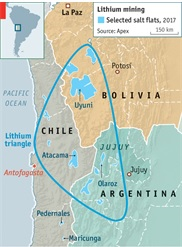

28th June 2022 (6 Topics)
Context
High-grade lithium has been discovered in Nigeria.
About
High-grade lithium:
- The Geological Agency described the lithium as high grade because what’s been found has between 1-13 per cent oxide content.
- Normally exploration begins at levels as low as 0.4 percent.
- Grade (in per cent) is a measure of concentration of the lithium in the minerals and or rocks that contains it.
- Therefore, the higher the grade the more the economic viability. Higher grades are very rare for metals like lithium.
About Lithium:
- Lithium is a chemical element with symbol Li and atomic number 3.
- It is a soft, silvery-white alkali metal.
- Under standard conditions, it is the lightest metal and the lightest solid element.
- Lithium is highly reactive and flammable, and is stored in mineral oil.
- It never occurs freely in nature, but only in (usually ionic) compounds, such as pegmatitic minerals, which were once the main source of lithium.
- Due to its solubility as an ion, it is present in ocean water and is commonly obtained from brines.
- Lithium metal is isolated electrolytically from a mixture of lithium chloride and potassium chloride.
- Lithium is a key component used in Electric Vehicle batteries. And India, through its Rs. 18,100- crore PLI scheme is offering incentives for companies to build battery cells locally.
- China and Hong Kong are the biggest lithium battery suppliers to India.
|
Lithium Triangle:
|
|
Lithium-ion batteries: Lithium-ion batteries are generally more expensive but have better performance and are becoming the preferred technology. The different types are:
|
Global Lithium Production:
- Greenbushes mine in Western Australia is the largest hard-rock lithium mine in the world.
- Global lithium mine production hit a record high of 100,000 tonnes in 2021, a 21 per cent increase over 2020.
- According to 2020 data, three countries, Australia (40,000 tonnes), Chile (20,600 tonnes) and China (14,000 tonnes) mine about 86 per cent of the world’s lithium.
- Others are Argentina (6,200 tonnes), Brazil (1,900 tonnes), Zimbabwe (1,200 tonnes), USA (900 tonnes) and Portugal (900 tonnes).
Lithium in Nigeria:
- In Nigeria, lithium minerals (spodumene and lepidolite) are known to be associated with cassiterite, columbite-tantalite (coltan) and others in the extensive belt of rare metal-bearing rock types called pegmatite.



